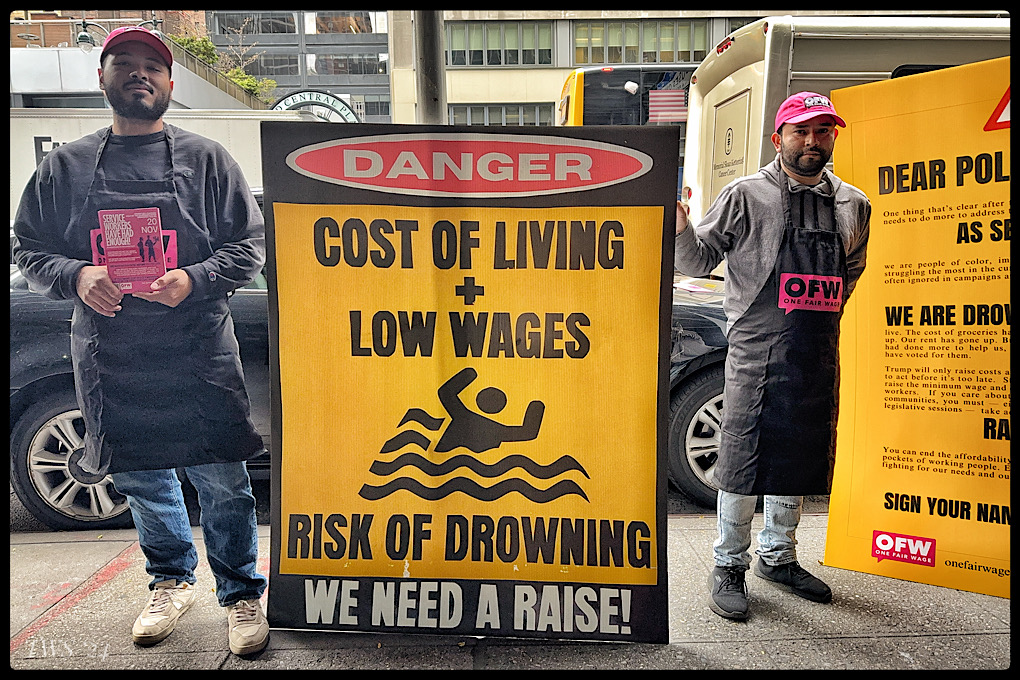Earlier today, in front of the city offices of Governor Kathy Hochul on 3rd Avenue in Midtown, the nonprofit One Fair Wage held a rally demanding swift action to raise wages for service workers. The group handed out turkeys to passers-by, and planned on giving the governor a letter demanding the passage of One Fair Wage legislation which, according to the nonprofit’s literature, would ensure “fair wages and critical protections for tipped and low-wage workers, many of whom are women, immigrants, and people of color.”
“People’s general impression of a tipped worker is that they make a lot of money in tips,” said Rebecca Rodriguez, One Fair Wage’s legislative director. “The fact is that two thirds of them don’t make enough to even pay federal income tax.” The New York State minimum wage is sixteen dollars an hour as of January 2024, but for tipped food service workers there’s a subminimum wage at $10.65 paid by the employer, with a $5.35 “tip credit” coming from the employer to make up the rest if the hourly wage plus tips falls below that. The tip credit system is broadly viewed as an industry carve-out courtesy of the National Restaurant Association (known to advocates as “the other NRA”), as it is virtually unenforceable, and at best must be clawed back after the fact, with an Obama-era sweep from the Department of Labor finding over 1,100 tip-credit violations resulting in $5.5 million in back-pay over a 2-year period. Even within the category of tipped workers, those in food service have been “carved out of progress,” explained Rodriguez, as workers in other industries where tipping is customary, like nail salons and car washes, do benefit from the standard minimum wage.

The goal for One Fair Wage, as the name implies, is to eliminate the separate subminimum wage altogether – a change which 8 states have implemented, including California. Right now, such a bill is on deck in New York’s legislature, sponsored by State Senator Robert Jackson and Assemblymember Jessica Gonzalez-Rojas. States that have implemented a universal minimum wage have found that it alleviates poverty while contributing to higher growth.
For some of the workers here today with One Fair Wage, stagnant pay in the face of mounting expenses has contributed to an embittered outlook on life in the city. “It’s not looking like a dream anymore,” said Jorge Romero Seleño, who juggles working as a cook and plumber’s apprentice after moving here from Texas. One Fair Wage’s push for a universal minimum wage in the city is a start, but Jorge is feeling the pressure despite making around $20 an hour at both gigs. “It’s still not enough to live a good life here in New York, you probably have to shack up with someone.” He tells La Voce how he has sacrificed personal stability in the face of economic pressures, living on a couch in an apartment with four other people in the Bronx. He moved there after renting a room in Queens for $1,000 a month.
One Fair Wage’s rally today comes as a string of reports demonstrates the ways in which life in New York City is taking a Dickensian turn over the past few years. An analysis from Advocates for Children published earlier this week found that 146,000 children experienced homelessness last year, a jump of over 26,000 from the previous year. Another study from Columbia University and Robin Hood found that 18% of families have made use of food pantries last year, nearly double pre-pandemic levels, while a report sponsored by the United Way of New York City and the Fund for the City of New York from last year found that half of New York City households don’t make enough money to meet their basic needs, as costs have more than doubled since the year 2000, far outpacing wage growth.
“I think most of the people living here don’t make that much,” says Jorge, “and the people that do kind of want to keep it that way.”












